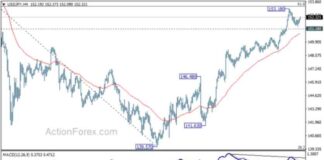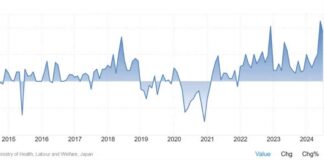Chip Stocks Experience Sharp Decline as Nvidia Drops 10% – Biggest Fall Since March 2020
The tech sector was rattled on Tuesday as chip stocks experienced a sharp decline, led by Nvidia’s significant drop of 9.5%. This marked the biggest fall for the company since March 2020 and had a ripple effect on other major players in the industry. Intel fell almost 8%, Marvell slid 8.2%, Broadcom lost about 6%, AMD dropped 7.8%, and Qualcomm fell close to 7%. The VanEck Semiconductor ETF (SMH), which tracks semiconductor stocks, was down 7.5%, its worst day since March 2020.
The decline in chip stocks came after the ISM manufacturing index reported below-consensus figures for August, raising concerns about the strength of the economy. The disappointing data also fueled speculation that the Federal Reserve may consider cutting interest rates to stimulate economic growth. These factors combined to create a bearish sentiment in the market, leading to widespread sell-offs in the tech sector.
Nvidia’s Dominance and Recent Performance
Nvidia, a leading player in the chip industry, has been a key driver of growth in the sector. The company’s CEO, Jensen Huang, unveiled the new Blackwell GPU chip during the Nvidia GPU Technology Conference in San Jose, California, on March 18, 2024. Nvidia’s stock has been on a steady rise, up 118% in 2024, fueled by optimism surrounding the artificial intelligence boom.
Last week, Nvidia reported impressive revenue of $30 billion for the quarter ending in July, surpassing Wall Street’s already elevated expectations. The company’s data center business, which includes AI processors, saw a remarkable 154% increase in revenue on an annual basis. This growth was driven by major cloud and internet giants purchasing billions of dollars worth of Nvidia chips each quarter.
Despite Nvidia’s strong performance, some investors were disappointed by the company’s sales forecast for the current quarter. This outlook briefly impacted chipmakers that supply Nvidia with memory and other components, causing a broader sell-off in the industry.
Competition and Innovation in the Chip Sector
While Nvidia has been a dominant force in the AI chip market, other companies are vying to capitalize on the sector’s growth. Intel and AMD have made strides in selling AI chips, although their market penetration remains limited compared to Nvidia. Broadcom is collaborating with tech giants like Google to develop custom AI chips, while Qualcomm is positioning its chips as the preferred choice for running AI applications on Android phones.
Intel made headlines on Tuesday by announcing new laptop processors capable of running AI programs on the device itself, reducing the reliance on cloud servers. This innovation underscores the ongoing efforts by chip manufacturers to enhance the capabilities of their products and cater to the growing demand for AI-driven technologies.
Looking ahead, Broadcom is set to report its third-quarter earnings on Thursday, providing further insights into the performance and outlook of the chip industry. With competition intensifying and technological advancements driving rapid changes in the sector, investors are closely monitoring developments to gauge the future trajectory of chip stocks.
Overall, the recent decline in chip stocks, particularly Nvidia’s sharp drop, highlights the volatility and sensitivity of the tech sector to economic data and market sentiment. As companies continue to innovate and compete in the ever-evolving chip industry, the landscape remains dynamic, presenting both challenges and opportunities for investors and stakeholders alike.

















